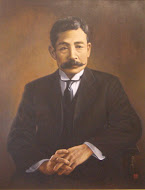William Shakespeare - Sonet CXIX
Ce lacrimi de sirenă am sorbit,
Din alambic de iad înşelător,
Speram cu teamă, deznădăjduit,
Pierdeam când mă vedeam biruitor!
Ce erezie inima comite,
Când prea blagoslovită se socoate!
Cum mi-au stat ochii-afară din orbite,
În zăpăceala febrei delirante!
E darul bolii,-acum mă învoiesc,
Cucuta cu osândă se-ndulceşte;
Iubirea dusă, de-o reconstruiesc,
Mai mult ca la-nceput mă istoveşte.
Prin caznă mă re-mpac cu-al meu puţin,
Şi de trei ori ce-am irosit obţin.
What potions have I drunk of Siren tears,
Distilled from limbecks foul as hell within,
Applying fears to hopes, and hopes to fears,
Still losing when I saw myself to win!
What wretched errors hath my heart committed,
Whilst it hath thought itself so blessed never!
How have mine eyes out of their spheres been fitted,
In the distraction of this madding fever!
O benefit of ill! now I find true
That bitter is by evil still made better;
And ruined love, when it is built anew,
Grows fairer than at first, more strong, far greater.
So I return rebuked to my content,
And gain by ill thrice more than I have spent.
traducere: Laurean Mihai Gherman
Etichete:
- POEZIE,
William SHAKESPEARE
William Shakespeare - Sonet XXVII
Împovărat, zoresc spre patul meu,
Astâmpăr celui frânt de colindat;
Dar se porneşte-alt drum în capul greu
De gânduri, într-un trup epuizat:
Căci grija mi-e departe de unde zac,
Pelerinaj zelos voind spre tine,
Genele grele-mi stau deschise larg,
Privind în beznă, cum văd orbii bine:
Doar că-n imaginaru-nfăţişat,
Profilul tău mi-e dat vederii, boantă,
Odor, în noaptea hâdă, suspendat
Ce face noaptea neagră captivantă.
Iată cum ziua-i trudă, noaptea-i gând,
Iar tu, nici eu, nu ne-odihnim nicicând.
(1609)
https://www.facebook.com/SoneteShakespeare
Traducere: Laurean Mihai Gherman
Etichete:
- POEZIE,
William SHAKESPEARE
William Shakespeare - Sonet XLI
Cu voie faci iertabile greşeli,
Când îţi lipsesc din suflet uneori,
Cum anii fragezi se cuvin rebeli,
Tentaţia ţi-e sfetnic deseori.
Eşti cavaler, astfel de cucerit,
Tu eşti plăcută, demnă de curtat;
Când o femeie-ncearcă, ce tâmpit
Renunţă fără a fi profitat?
Însă puteai să nu te-atingi de ea,
Strunind juneţe şi tumult hoinar,
Ce către desfrânare te-ar forţa
Şi dublul legământ călcându-l iar:
Tentat de al ei farmec fecioresc,
De frumuseţea ta-am să mă feresc.
When I am sometime absent from thy heart,
Thy beauty, and thy years full well befits,
For still temptation follows where thou art.
Gentle thou art, and therefore to be won,
Beauteous thou art, therefore to be assailed;
And when a woman woos, what woman's son
Will sourly leave her till he have prevailed?
Ay me! but yet thou mightst my seat forbear,
And chide thy beauty and thy straying youth,
Who lead thee in their riot even there
Where thou art forced to break a twofold truth:
Hers by thy beauty tempting her to thee,
Thine by thy beauty being false to me.
Traducere: Laurean Mihai Gherman
Etichete:
- POEZIE,
William SHAKESPEARE
William Shakespeare - Sonet XXI
De muze n-am să mă mai las stârnit,
De frumuseţea lor sulemenită,
Cu cerul însuşi te-am împodobit
Orice fălos doar cu-n fălos repetă,
Cât să mă fi făcut să te compar
Cu astre, a lumii, a mărilor splendoare.
Cu prima floare-n an şi tot ce-i rar,
Şi poartă-n tiv telurica grandoare.
Dar fie să iubesc, să scriu ce simt,
Şi să îmi creadă dragostea curată,
Cum crede mama puiul, strălucit,
Şi-i pare că luceferii se-arată.
Mai spună alţii, vorbe mari având,
Nu te mai laud, că doar nu te vând.
So is it not with me as with that Muse,
Stirred by a painted beauty to his verse,
Who heaven itself for ornament doth use
And every fair with his fair doth rehearse,
Making a couplement of proud compare
With sun and moon, with earth and sea's rich gems,
With April's first-born flowers, and all things rare,
That heaven's air in this huge rondure hems.
O! let me, true in love, but truly write,
And then believe me, my love is as fair
As any mother's child, though not so bright
As those gold candles fixed in heaven's air:
Let them say more that like of hearsay well;
I will not praise that purpose not to sell.
Traducere: Laurean Mihai Gherman
Etichete:
- POEZIE,
William SHAKESPEARE
William Shakespeare - Sonet CXVI
N-am să admit că suflete-nnuntite
Au stavile. Iubiri nu sunt iubiri
De se preschimbă când sunt despărţite,
Ori se-ncovoaie sub dezamăgiri:
Ei bine, nu! iubirea-i far blindat,
Furtuna va privi-o neclintit;
Luceafăr pentru naufragiat,
De-i stins, el tot ne-apare răsărit.
Nu-s jucăria vremii, chiar de curmi
Cu coasa ei obraz sau buze reci;
Nu scad în ore sau în săptămâni,
Statornicesc întocmai până-n veci.
Dacă greşit se va fi dovedit,
Nu eu am scris, cum nimeni n-a iubit.
Let me not to the marriage of true minds
Admit impediments. Love is not love
Which alters when it alteration finds,
Or bends with the remover to remove:
O, no! it is an ever-fixed mark,
That looks on tempests and is never shaken;
It is the star to every wandering bark,
Whose worth's unknown, although his height be taken.
Love's not Time's fool, though rosy lips and cheeks
Within his bending sickle's compass come;
Love alters not with his brief hours and weeks,
But bears it out even to the edge of doom.
If this be error and upon me proved,
I never writ, nor no man ever loved.
Traducere: Laurean Mihai Gherman
Etichete:
- POEZIE,
William SHAKESPEARE
William Shakespeare - Sonet VIII
E muzică, de ce-asculţi cu mânie?
Frumosul nu-i potrivnic frumuseţii,
De ce iubeşti ceva ce nu te-mbie,
Mâhnirea ţi-e prilej de dispoziţii?
Dacă o armonie reuşeşte,
Nuntirea ei, auzul să-ţi rănească,
E doar dojană dulce, ce sminteşte
Spre solitar menirea ta firească.
Vezi lângă-o strună, soţ fiindu-i altă,
Cum se armonizează împreună;
Sunt mamă fericită, prunc şi tată,
Ce laolaltă scump acord îngână;
Un cântec mut din strune-ngemănate
Îţi fredonează: "singur, nu se poate".
Music to hear, why hear'st thou music sadly?
Sweets with sweets war not, joy delights in joy:
Why lov'st thou that which thou receiv'st not gladly,
Or else receiv'st with pleasure thine annoy?
If the true concord of well-tuned sounds,
By unions married, do offend thine ear,
They do but sweetly chide thee, who confounds
In singleness the parts that thou shouldst bear.
Mark how one string, sweet husband to another,
Strikes each in each by mutual ordering;
Resembling sire and child and happy mother,
Who, all in one, one pleasing note do sing:
Whose speechless song being many, seeming one,
Sings this to thee: 'Thou single wilt prove none.'
Traducere: Laurean Mihai Gherman
Etichete:
- POEZIE,
William SHAKESPEARE
William Shakespeare - Sonet XV
Când mă gândesc la lume ca perenă,
Cum e perfectă doar pentr-o clipită,
E-o simplă piesă pe-o imensă scenă,
De stele, în secret, înrâurită.
Când văd cum oameni cresc ca un răsad,
Dospiţi şi nimiciţi de-acelaşi cer,
Fuduli cât sunt vânjoşi, apoi decad,
Luându-şi fala-n colb după ce pier;
Doar socotind la traiul schimbător,
Şi-n ochii mei mai tânără devii,
Oricât e cursul de necrutăţor
Să-ţi schimbe zorii vieţii-n pământii,
Din dragoste, cu Timpul port război,
Iar tot ce-ţi ia, îţi voi grefa ‘napoi.
When I consider every thing that grows
Holds in perfection but a little moment,
That this huge stage presenteth nought but shows
Whereon the stars in secret influence comment;
When I perceive that men as plants increase,
Cheered and checked even by the self-same sky,
Vaunt in their youthful sap, at height decrease,
And wear their brave state out of memory;
Then the conceit of this inconstant stay
Sets you most rich in youth before my sight,
Where wasteful Time debateth with decay
To change your day of youth to sullied night,
And all in war with Time for love of you,
As he takes from you, I engraft you new.
Traducere: Laurean Mihai Gherman
Etichete:
- POEZIE,
William SHAKESPEARE
William Shakespeare - Sonet XLVIII
Cât de atent am fost când am plecat,
Să-mi pun la adăpost deşertăciuni,
Spre-al meu folos rămână ferecat,
Încrederea-mi păzind-o de minciuni!
Ce preţuiesc ţi-e fără-nsemnătate,
Ce mi-era tihnă e amarnic gând.
Tu, preaiubită, singura-ntre toate,
Lăsată pradă-oricărui hoţ de rând.
Cum de, în piept, nu te-am întemniţat,
Ştiu, unde nu poţi sta, dar simt că eşti,
Cu coasta, blând, te-aş fi îmbrăţişat,
Să poţi să vii, să pleci dacă doreşti;
Iar dacă şi de-acolo te-ar răpi,
Virtutea însăşi hoţ s-ar dovedi.
How careful was I when I took my way,
Each trifle under truest bars to thrust,
That to my use it might unused stay
From hands of falsehood, in sure wards of trust!
But thou, to whom my jewels trifles are,
Most worthy comfort, now my greatest grief,
Thou best of dearest, and mine only care,
Art left the prey of every vulgar thief.
Thee have I not locked up in any chest,
Save where thou art not, though I feel thou art,
Within the gentle closure of my breast,
From whence at pleasure thou mayst come and part;
And even thence thou wilt be stol'n I fear,
For truth proves thievish for a prize so dear.
Traducere: Laurean Mihai Gherman
Etichete:
- POEZIE,
William SHAKESPEARE
William Shakespeare - Sonet V
Aceleaşi ore care ţi-au croit
Trup adorabil desfătând priviri
S-or dovedi tirani cu-acelaşi chip
Frumosul covârşindu-l de sluţiri.
Timp fără tihnă, pe oricare vară
În iarnă o transformi şi o îngheţi,
Îngheaţă seva, frunzele-s povară,
Splendoarea-i desfrunzită sub nămeţi.
Când floarea vieţii nu o distilezi,
În vas de sticlă să o ţii captivă,
Nici fastul frumuseţii nu-l mai vezi,
Nici ce-o făcea să fie atractivă.
Te distilez şi iernii-i aţin drumul,
Când nu te văd, măcar să-ţi simt parfumul.
Those hours that with gentle work did frame
The lovely gaze where every eye doth dwell
Will play the tyrants to the very same
And that unfair which fairly doth excel.
For never-resting time leads summer on
To hideous winter and confounds him there,
Sap checked with frost and lusty leaves quite gone,
Beauty o'er-snowed and bareness everywhere.
Then were not summer’s distillation left,
A liquid prisoner pent in walls of glass,
Beauty’s effect with beauty were bereft,
Nor it nor no remembrance what it was.
But flowers distilled, though they with winter meet,
Leese but their show; their substance still lives sweet.
Traducere: Laurean Mihai Gherman
Etichete:
- POEZIE,
William SHAKESPEARE
William Shakespeare - Sonet XLVI
Sunt inimă şi ochi încăieraţi,
Izbânda de-a te fi avut s-o-mpart;
Ochiul nu vrea şi ei să te arăţi,
Ea se râvneşte volnic de-al său hart.
Pledează inima că-i eşti în sine,
Un scrin în care ochiul nu răzbeşte,
Dar acuzatul neagă-aceste vine,
A ta splendoare–n el se oglindeşte.
Pentru dreptate, se convoacă
Juriul de cuget, inimii dijmaş;
Iar prin verdicte, inima o-mpacă
Şi ostoieşte ochiul pătimaş:
Căci lui, făptura ta i se cuvine,
Iar ei, iubirea tăinuită-n tine.
Mine eye and heart are at a mortal war,
How to divide the conquest of thy sight;
Mine eye my heart thy picture's sight would bar,
My heart mine eye the freedom of that right.
My heart doth plead that thou in him dost lie,
A closet never pierced with crystal eyes,
But the defendant doth that plea deny,
And says in him thy fair appearance lies.
To 'cide this title is impannelled
A quest of thoughts, all tenants to the heart;
And by their verdict is determined
The clear eye's moiety, and the dear heart's part:
As thus: mine eye's due is thine outward part,
And my heart's right, thine inward love of heart.
Traducere: Laurean Mihai Gherman
Etichete:
- POEZIE,
William SHAKESPEARE
William Shakespeare - Sonet X
Sfiala-ţi neagă de-a purta iubire,
Ce pentru tine-i gest nechibzuit.
Admite, tu iubită eşti din fire,
Că nu iubeşti pe nimeni e vădit:
Dar sub imperiul urii sângeroase,
În contra ta ajungi să unelteşti,
Şi-ţi năruie a frumuseţii casă,
Când s-o înalţi e bine să-ţi doreşti.
Schimbându-te, îmi poţi schimba credinţa,
Cum poţi fi urii gazdă primitoare?
Fii milostivă, cum îţi e fiinţa,
Sau măcar ţie fie-ţi îngăduitoare:
Fii alta din iubire pentru mine,
Frumosul va trăi, în ea sau tine.
For shame deny that thou bear'st love to any,
Who for thy self art so unprovident.
Grant, if thou wilt, thou art beloved of many,
But that thou none lov'st is most evident:
For thou art so possessed with murderous hate,
That 'gainst thy self thou stick'st not to conspire,
Seeking that beauteous roof to ruinate
Which to repair should be thy chief desire.
O! change thy thought, that I may change my mind:
Shall hate be fairer lodged than gentle love?
Be, as thy presence is, gracious and kind,
Or to thyself at least kind-hearted prove:
Make thee another self for love of me,
That beauty still may live in thine or thee.
Traducere: Laurean Mihai Gherman
Etichete:
- POEZIE,
William SHAKESPEARE
William Shakespeare - Sonet XXXIX
Oh! cum te pot cânta cum se cuvine,
Când toată eşti tot ce am eu mai bun?
Ce haznă are-o rugă pentru mine,
Când ruga tot de dragul tău o spun?
Chiar şi aşa, trăind-o separat,
Iubirea nu mai poartă-acelaşi nume,
Dar împărţind-o, te-aş fi înzestrat
Cu tot ce numai ţie-ţi se cuvine.
Absenţă, eşti supliciu dovedit,
Când tihna ta nu-mi e-ngăduitoare,
Să destind timpu-n gânduri de iubit.
Sunt timp şi gânduri dulci decepţii oare?
Mă-nvaţă toate cum să fac iar doi,
Ruga-i în van, departea mea rămâi.
O! how thy worth with manners may I sing,
When thou art all the better part of me?
What can mine own praise to mine own self bring?
And what is't but mine own when I praise thee?
Even for this, let us divided live,
And our dear love lose name of single one,
That by this separation I may give
That due to thee which thou deserv'st alone.
O absence! what a torment wouldst thou prove,
Were it not thy sour leisure gave sweet leave,
To entertain the time with thoughts of love,
Which time and thoughts so sweetly doth deceive,
And that thou teachest how to make one twain,
By praising him here who doth hence remain.
Traducerea Laurean Mihai Gherman
Etichete:
- POEZIE,
William SHAKESPEARE
William Shakespeare - Sonet XVI
Cum să nu ai un fel maiestuos
Să lupţi cu timpul, nemilos tiran ?
Să fii mai tânără din an în an,
Cu graţia-a mai mult decât un vers ?
Tu poţi să stai deasupra orelor,
Iar feciorelnice grădini, nezămislite,
Smerite să-ţi rodească ţie flori
Cu-a tale haruri mai asemuite.
Astfel că nici urmaşi ce viaţă-ţi cer,
Timpul sau pana mea, ce slavă-ţi vor,
Nici suflet bun, nici farmec efemer,
Te-or face să trăieşti în ochii lor.
Doar de te-i dărui, vei şi rămâne,
Trăind prin ce se va-ntrupa din tine.
But wherefore do not you a mightier way
Make war upon this bloody tyrant, Time?
And fortify your self in your decay
With means more blessed than my barren rhyme?
Now stand you on the top of happy hours,
And many maiden gardens, yet unset,
With virtuous wish would bear you living flowers,
Much liker than your painted counterfeit:
So should the lines of life that life repair,
Which this, Time's pencil, or my pupil pen,
Neither in inward worth nor outward fair,
Can make you live your self in eyes of men.
To give away yourself, keeps yourself still,
And you must live, drawn by your own sweet skill.
Traducerea Laurean Mihai Gherman
Etichete:
- POEZIE,
William SHAKESPEARE
William Shakespeare - Sonet XVII
Cine-mi va crede versu-n viitor?
Era cu al tău farmec împlinit.
Poemu-n timp devine un cavou,
Fără trăire, te-a-njumătăţit.
Dac-aş descrie chipul tău frumos,
Enumerându-ţi fiecare har,
Cei ce-or veni mi-ar spune „Mincinos:
Pe-aici chipuri de înger nu apar.”
Şi ce-aş fi scris, îngălbenit de vremi,
Vor fi scorneli de batrânel limbut,
Iar farmecele tale - aiureli,
Cum se scriau poemele-n trecut.
Dar dacă un copil ai zămisli,
În el şi-n versul meu te-ar regăsi.
Who will believe my verse in time to come,
If it were filled with your most high deserts?
Though yet, heaven knows, it is but as a tomb
Which hides your life and shows not half your parts.
If I could write the beauty of your eyes
And in fresh numbers number all your graces,
The age to come would say „This poet lies:
Such heavenly touches never touched earthly faces.”
So should my papers yellowed with their age
Be scorned like old men of less truth than tongue,
And your true rights be termed a poet's rage
And stretched metre of an antique song:
But were some child of yours alive that time,
You should live twice; in it and in my rhyme.
Traducere: Laurean Mihai Gherman
Etichete:
- POEZIE,
William SHAKESPEARE
William Shakespeare - Sonet XL
Iubire, ia-mi iubirile, pe toate;
Ce ai avea în plus de ce-ai avut?
N-ai să le poţi numi adevărate;
Tu aveai tot, apoi să ai mai mult?
De m-ai primit, simţindu-te dorită,
Nu-ţi pot blama iubirea folosită,
Te-aş condamna doar dacă, amăgită,
Răsfăţul să-mi refuzi eşti îndoită.
Îţi iert hoţia, graţios pungaş,
Deşi astfel mi-ai luat întreg avutul:
Iubirea-şi este singurul vrăjmaş,
Greşindu-şi, e mai grav decât urâtul.
Amor lasciv, eşti răul ce-l privim,
Ucide-mă, dar nu ne învrăjbim.
Take all my loves, my love, yea take them all;
What hast thou then more than thou hadst before?
No love, my love, that thou mayst true love call;
All mine was thine, before thou hadst this more.
Then, if for my love, thou my love receivest,
I cannot blame thee, for my love thou usest;
But yet be blam'd, if thou thy self deceivest
By wilful taste of what thyself refusest.
I do forgive thy robbery, gentle thief,
Although thou steal thee all my poverty:
And yet, love knows it is a greater grief
To bear love's wrong, than hate's known injury.
Lascivious grace, in whom all ill well shows,
Kill me with spites yet we must not be foes.
Traducere: Laurean Mihai Gherman
Etichete:
- POEZIE,
William SHAKESPEARE
Jorge Luis Borges - Artă poetică
Privind la râul cel făcut din timp şi apă
să-ţi aminteşti că timpul este tot un râu,
să ştii c-aşa ne ducem, ca un râu
şi feţele dispar ca finii stropi de apă.
Să simţi că veghea e un somn, alt somn
visând că nu visează, şi că moartea
de care ni se teme carnea este moartea
din fiecare noapte, ce se cheamă somn.
Să vezi în ziuă şi în an un semn
de ani şi zile ce avem în viaţă,
şi paguba ce-o fac să o preschimbi în viaţă
într-o cântare, o rumoare şi un semn.
Să vezi în moarte somnul, şi-n apus
un aur trist, aşa e poezia
care-i nemuritoare şi săracă. Poezia
aşa se-ntoarnă, ca o auroră şi-un apus.
Spre înserat vedem ades o faţă
privindu-ne din funduri de oglindă;
şi arta e menită ca oglindă
ce ne revelă chiar a noastră faţă.
Ulise, zice-se, sătul fiind de minuni,
de bucurie plâns-a revăzând Itaca,
cea verde şi umilă. Şi precum Itaca
şi arta e, de veşnică verdeaţă, nu minuni.
Asemeni e ca râul infinit
ce trece şi rămâne şi-i cristal, acelaşi
şi altul iar, ca Heraclit, acelaşi
şi mereu altul, tot ca râul infinit.
traducere Paul Abucean
Etichete:
- POEZIE,
Jorge Luis BORGES
Abonați-vă la:
Postări (Atom)






































